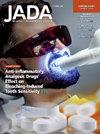美国成人心理健康损害和口腔保健使用,医疗支出小组调查2017-2021。
IF 3.1
2区 医学
Q1 DENTISTRY, ORAL SURGERY & MEDICINE
引用次数: 0
摘要
背景:精神疾病可导致精神健康(MH)损害,如兴趣下降和全身疲劳。MH损伤会对口腔健康产生不利影响。本研究的目的是调查口腔保健障碍、口腔保健护理和口腔保健使用之间的关系。方法:这项横断面研究使用了2017-2021年医疗支出小组调查中具有全国代表性的美国成年人数据。采用Pearson χ2检验和logistic回归评估口腔卫生保健使用与MH损害、口腔卫生保健使用与MH护理使用之间的关系。回归控制了年龄、性别、种族和民族、收入、教育程度、调查年份、婚姻状况、地理区域和牙科保险状况。结果:MH损伤与较低的使用任何牙科护理的几率相关(优势比[OR], 0.85;95% CI, 0.81 - 0.90)和预防保健(OR, 0.79;95% CI, 0.74 - 0.84),且口腔手术的几率较高(OR, 1.32;95% CI, 1.20 - 1.46)使用。接受医院护理与接受整体牙科护理的几率较高相关(OR, 1.62;95% CI, 1.43 ~ 1.82;P < 0.001),预防保健(OR, 1.72;95% CI, 1.52 ~ 1.96;P < 0.001),恢复性护理(OR, 1.26;95% CI, 1.05 ~ 1.50;P = 0.01)使用。结论:MH损伤与较低的预防性和整体牙科护理使用几率以及较高的口腔手术使用几率相关。对于患有牙病损伤的成年人,接受牙病护理与预防性、恢复性和整体牙科护理使用的较高几率相关。实际意义:精神疾病可能是获得预防性牙科保健的障碍。然而,医院护理服务可能有助于增加预防性,恢复性和整体口腔保健的使用。本文章由计算机程序翻译,如有差异,请以英文原文为准。
Adult mental health impairment and oral health care use in the United States, Medical Expenditure Panel Survey 2017-2021
Background
Mental illnesses can cause mental health (MH) impairments such as decreased interest and generalized fatigue. MH impairments can adversely affect oral health. The aim of this study was to investigate the associations between MH impairment, MH care, and oral health care use.
Methods
This cross-sectional study used nationally representative data of US adults from the 2017-2021 Medical Expenditure Panel Survey. Pearson χ2 test and logistic regressions were used to assess the associations between oral health care use and MH impairment and oral health care use and MH care use. Regressions controlled for age, sex, race and ethnicity, income, education, survey year, marital status, geographic region, and dental insurance status.
Results
MH impairment was associated with lower odds of using any dental care (odds ratio [OR], 0.85; 95% CI, 0.81 to 0.90) and preventive care (OR, 0.79; 95% CI, 0.74 to 0.84) and with higher odds of oral surgery (OR, 1.32; 95% CI, 1.20 to 1.46) use. Receiving MH care was associated with higher odds of using overall dental care (OR, 1.62; 95% CI, 1.43 to 1.82; P < .001), preventive care (OR, 1.72; 95% CI, 1.52 to 1.96; P < .001), and restorative care (OR, 1.26; 95% CI, 1.05 to 1.50; P = .01) use.
Conclusions
MH impairment was associated with lower odds of preventive and overall dental care use and with higher odds of oral surgery use. For adults with MH impairment, receiving MH care was associated with higher odds of preventive, restorative, and overall dental care use.
Practical Implications
Mental illness can be a barrier in accessing preventive dental care. However, MH care service may aid in increasing preventive, restorative, and overall oral health care use.
求助全文
通过发布文献求助,成功后即可免费获取论文全文。
去求助
来源期刊

Journal of the American Dental Association
医学-牙科与口腔外科
CiteScore
5.30
自引率
10.30%
发文量
221
审稿时长
34 days
期刊介绍:
There is not a single source or solution to help dentists in their quest for lifelong learning, improving dental practice, and dental well-being. JADA+, along with The Journal of the American Dental Association, is striving to do just that, bringing together practical content covering dentistry topics and procedures to help dentists—both general dentists and specialists—provide better patient care and improve oral health and well-being. This is a work in progress; as we add more content, covering more topics of interest, it will continue to expand, becoming an ever-more essential source of oral health knowledge.
 求助内容:
求助内容: 应助结果提醒方式:
应助结果提醒方式:


